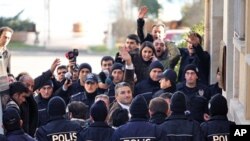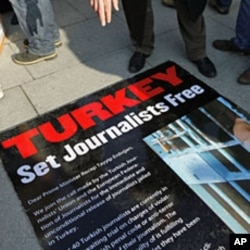Turkey's release on bail of two high-profile journalists, after a more than a year in jail, is being heralded as an important victory for press freedom.
The jailing of Neden Sener and Ahmet Sik on anti-terror charges had drawn condemnation both nationally and internationally. But with the journalists still facing trial and with more than 100 other journalists still in prison, pressure remains on the government for reform.
Neden Sener and Ahmet Sik were among four Turkish journalists released on Monday to cheering supporters, many of whom were fellow journalists. The two reporters had been in jail pending trial for more than a year. But in a surprise move, a court released them on bail on legal technicalities, along with two other colleagues. Ahmet Sik angrily attacked his detention.
He called the justice inadequate, and said it will not bring law and democracy to Turkey. Sik said around 100 other journalists are still in prison.
Sik and Sener were detained under the country's anti-terror laws. They were accused of involvement in an alleged conspiracy to overthrow the government, known as Ergenekon. Both are well-known journalists who are critical of the ruling AK party. Their cases have become the focal point of growing national and international concern about the growing numbers of imprisoned journalists in Turkey.
Emma Sinclair Webb, the Turkish representative of U.S.-based Human Rights Watch, cautiously welcomed their release.
"The very fact getting out of prison is itself such a relief and lightens the climate somewhat, when you have two people who are so well-known released from prison. Of course, there are reasons to be very glad. But there are [those] still on trial, for aiding and abetting an illegal armed gang," said Webb.
The two journalists whose trials are in June face up to 15 years in jail if convicted. According to the Council of Europe, more than 90 journalists are currently in jail, while Turkish human rights groups claim the figure is more than 100. That is among the highest in the world. But Turkish Prime Minister Recep Tayyip Erdogan disputes the numbers.
Mr. Erdogan said only six people are officially accredited journalists. He says 69 others are associated with terrorist organizations and have nothing to do with journalism.
The vast majority of the detained journalists are held under Turkey's anti-terror laws. Most of the cases involve prosecutions in connection with the Kurdish rebel group, the PKK. But critics claim the language in the anti-terror laws has allowed them to be used against government critics.
Criticism has been growing in particular from the European Union, which Turkey is seeking to join. Richard Howitt is a member of the European Parliament's committee on Turkey.
"There is no doubt that some of them are being prosecuted for criminal activities alleged, and maybe some of them are guilty," said Howitt. "But there is also no, absolutely no, doubt I have to say that some of them are in jail because they have written or broadcast things which are unpalatable to the government and to the authorities in this country, and that is not just unpalatable to those of us in Brussels and European Union. It is unacceptable."
The cases of Sik and Sener were raised at last month's biannual meeting of European and Turkish parliamentarians in Istanbul. The decision to release two high-profile cases could be an indication of a change in government policy, according to political scientist Cengiz Aktar of Istanbul's Bachesehir University.
"In Turkey, the power, the ruling power, is so personalized that such an important move can come only from the prime minister, and indicates his will to, the optimistic scenario would be, he may shift his position on the public freedoms," said Aktar..
Turkish Deputy Prime Minister Bulent Arinc welcomed the release of Sener and Sik. But Sinclair Webb of Human Rights Watch, worries their release may only be a symbolic gesture. She said fundamental reforms are still needed.







